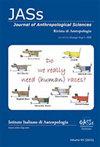What is race today? Scientific, legal, and social appraisals from around the globe.
IF 2.3
2区 社会学
Q1 ANTHROPOLOGY
Journal of Anthropological Sciences
Pub Date : 2017-12-30
Epub Date: 2017-07-31
DOI:10.4436/JASS.95016
引用次数: 2
Abstract
Race is a core concept in science and society. Yet, the meaning of the concept is constantly changing and varies by language and country. In science, race was once an unchallenged concept that was used to describe human biological or genetic variation, but we now know that dividing individuals into races is typological and explains a small fraction of variation. In this sense, race is an outdated idea and a myth. Yet, race continues to be used as a scientific term in many publications and fields such as medicine and forensic anthropology. In society, race has also changed in many complex ways, and varies by language, history, culture, and national tradition. Race is a global concept with profoundly local dynamics. Race in law, society and the public sphere is so salient today because racism is. The purpose of this forum is to provide a basis for comparing the “state of the art” of debates around race, human biological variation and racism in science and society in different countries. The first set of articles that follows are from European countries and the United States. How is race used in science, law and other intersecting domains such as everyday and political discourse? Giovanni Destro Bisol, JASs Editor, suggested the idea for this forum and I have been honored to work with him. We hoped that others would contribute their own analyses on the state of race in countries they are most familiar with. While each author has been free to take the topic in directions that make the more senses to them, we provided some guiding questions.今天的种族是什么?来自世界各地的科学、法律和社会评价。
本文章由计算机程序翻译,如有差异,请以英文原文为准。
求助全文
约1分钟内获得全文
求助全文
来源期刊

Journal of Anthropological Sciences
Social Sciences-Anthropology
CiteScore
2.20
自引率
5.60%
发文量
7
期刊介绍:
The Journal of Anthropological Sciences (JASs) publishes reviews, original papers and notes concerning human paleontology, prehistory, biology and genetics of extinct and extant populations. Particular attention is paid to the significance of Anthropology as an interdisciplinary field of research. Only papers in English can be considered for publication. All contributions are revised by the editorial board together with the panel of referees.
 求助内容:
求助内容: 应助结果提醒方式:
应助结果提醒方式:


